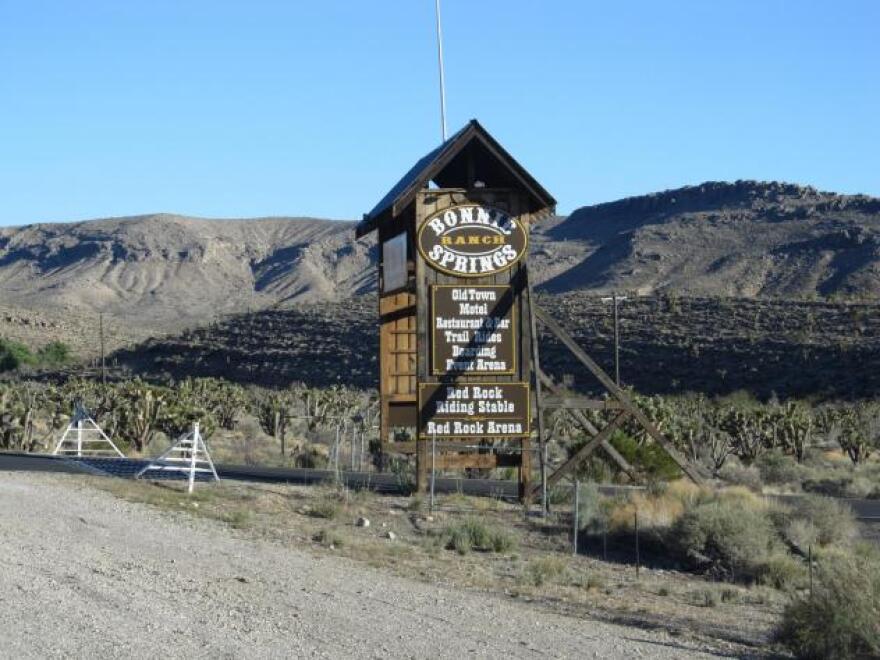Bonnie Springs is closing this month.
The beloved western-themed attraction out at Red Rock Canyon was home to a bar, restaurant, motel and petting zoo.
The property dates back to 1843 when it was a stopover for wagons traveling west, and it’s been in its current form since Bonnie McGaugh Levinson purchased it in 1958.
McGaugh Levinson died last year, and her family sold the property.
Now, the new owners want to build luxury homes there.
Like every proposal having to do with development in Red Rock, of course there’s opposition.
Under the plan, the developer would like to build 20 homes on the 64 acres of land, along with an events center and a bed and breakfast.
But almost immediately after the story broke, an online petition started, opposing the sale and asking that Bonnie Springs be designated a historic landmark. The petition has over 55,000 signatures.
Shea Johnson, who has been covering the story for the Las Vegas Review-Journal, says the petition can't do much.
"We know that even if something is made a historic landmark it doesn't preclude it from being sold or developed," he said. "Basically, all that would do would say, 'this is something that has historical value.'"
Johnson said there two basic arguments when it comes to the opposition to development at Bonnie Springs. The first is a feeling of nostalgia by longtime residents of Southern Nevada who visited the ranch as kids.
The second argument is that the development will destroy one of the most beautiful areas in Southern Nevada and it will open other areas of private land surrounding Red Rock for development.
"The Levinson family has decided they no longer want to operate this ranch, but the secondary issue is then what should happen with it," Johnson said.
One of the people who has fond childhood memories of going to Bonnie Springs is James Reza, a contributing writer for Desert Companion magazine.
Reza was born and raised in Las Vegas and he remembers the long drive home from the ranch when the city ended at Rainbow Boulevard.
While he understands why people don't want to see the ranch go, it is private land and the property owners can do what they want with it.
"A family owns a piece of property for 60 years, which is greater than half the life of Las Vegas, at some point you imagine the family is going to want to get out of owning that property," he said. "And then, part of the western ethos is property rights. I think that's an important part of who we are out here and I think we can't step on those."
Despite that, Reza is concerned that the development might open up the 2,000 other acres of privately held land surrounding Red Rock for development.
"There is a possibility that these pockets of commercially zoned or privately owned, privately held land could be developed," he said. "That would be a concern for me but at the same time I have to balance that out with my respect for property rights."
The group Save Red Rock is working hard to stop those parcels of land from being turned into something they believe would hurt the area.
Pauline Van Betten is the group's director. She said conservation dollars don't come together as fast as money from developers, making it difficult for conservation groups to preserve land before a developer buys it.
"What we're trying to do is get ahead of that fast curve that the real estate market has and look to some funding sources to try to purchase these lands, or try to work with this owner, maybe get a conservation easement," she said.
In the case of Bonnie Springs, Van Betten says the developer of the housing project at Bonnie Springs has gone above and beyond to make the project fit within the desert landscape.
She said he is following the Red Rock Overlay, which is a set of rules established by the Clark County Commission more than 10 years ago. They cover everything from lighting to the color of the buildings. She also pointed out that Joe Laub, the developer, is the board chair of the Nature Conservancy.
While Van Betten has praised Laub for his efforts, Patrick Donnelly, the state director for the Center for Biological Diversity, doesn't agree with the argument that it could have been worse.
"Saying something is less bad than it could be, doesn't make it okay," he said. "I think there has been somewhat of an effort to 'greenwash' this development. Mr. Laub ... is the president of the board of the Nature Conservancy and that is really very galling."
Donnelly said the Nature Conservancy is one of the most important environmental groups in the state.
"It is really galling that the president of the board of that organization would be putting sprawl into our national conservation area," he said.
For Donnelly and his group, the idea of sprawl on or near public lands is concerning.
"Putting 20 McMansions at the base of the cliffs of our beautiful Red Rock Canyon National Conservation Area would represent the slow chipping away of the integrity of our protected public lands," he said.
And while Bonnie Springs and other pieces of land are privately owned, he doesn't believe that gives the owners "unfettered right to do what they want."
"These lands are part of Red Rock Canyon National Conservation Area even if they are private and that needs to be respected," he said.
KNPR News invited Joel Laub and his lawyer Bob Gronauer to be part of the discussion, but they canceled after an appeal was filed with the Clark County Commission.
That appeal is expected to be heard at the end of the month.
Shea Johnson, reporter, Las Vegas Review-Journal; James Reza, contributing writer, Desert Companion Magazine; Patrick Donnelly, Nevada state director, Center for Biological Diversity; Pauline Van Betten, director, Save Red Rock









